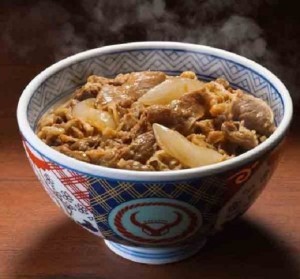
Beef bowls are cheap, tasty and filling, so does that mean they have to be bad for you?
Yoshinoya is the biggest purveyor of one of Japan’s favorite convenient meals: the beef bowl, or “gyudon,” as it’s called in Japanese. With Yoshinoya locations covering the country, open from early in the morning until late at night, the chain boasts a loyal legion of repeat customers. As a matter of fact, if there’s a branch near their campus or workplace, some people may eat Yoshinoya’s beef bowls on a near-daily basis.
But does a steady stream of gyudon have any adverse effects on the body? To find out, Yoshinoya announced last fall that it would be launching a three-month study on a beef-bowl intensive diet, in cooperation with Kyoto’s Doshisha University. A total of 24 participants, both men and women, were selected for the experiment.
I – Word Understanding
purveyor – seller
beef-bowl intensive diet – a diet that includes beef bowl on a daily basis
II – Have Your Say
1. They say, gyudon is a comfort food for most Japanese, can be prepared quickly and has nutritious ingredients. Can you explain how to prepare gyudon?
2. Let’s rate some of Japan’s affordable and “quick-served” dishes as to price, service, taste and of course their impact to consumers’ health. Please feel free to add some of your favorites not listed below:
– Gyudon
– Ramen
– Soba / Udon
– Curry
– Bento
3.The three-month period “gyudon diet” study ended in early December, and the results have just been announced: Researchers found no significant changes in the weight, body fat percentage, or blood pressure of the participants, nor in their blood-sugar, cholesterol, or triglyceride levels, compared to data taken before starting the daily gyudon diet. Does this mean gyudon is healthy? or is the 3-month study not long enough?
379 What does 3 months of Yoshinoya beef bowls do to your body?


